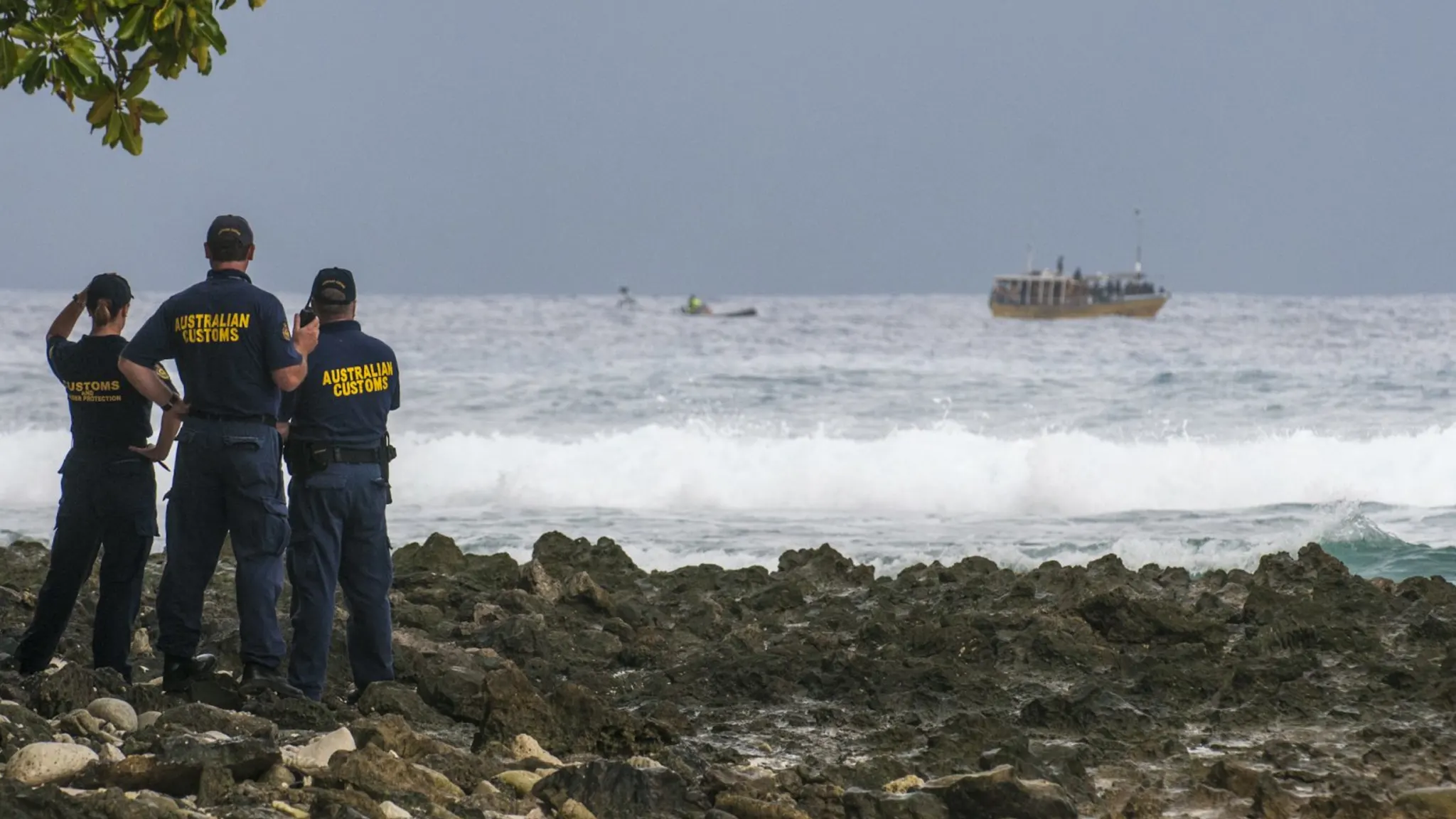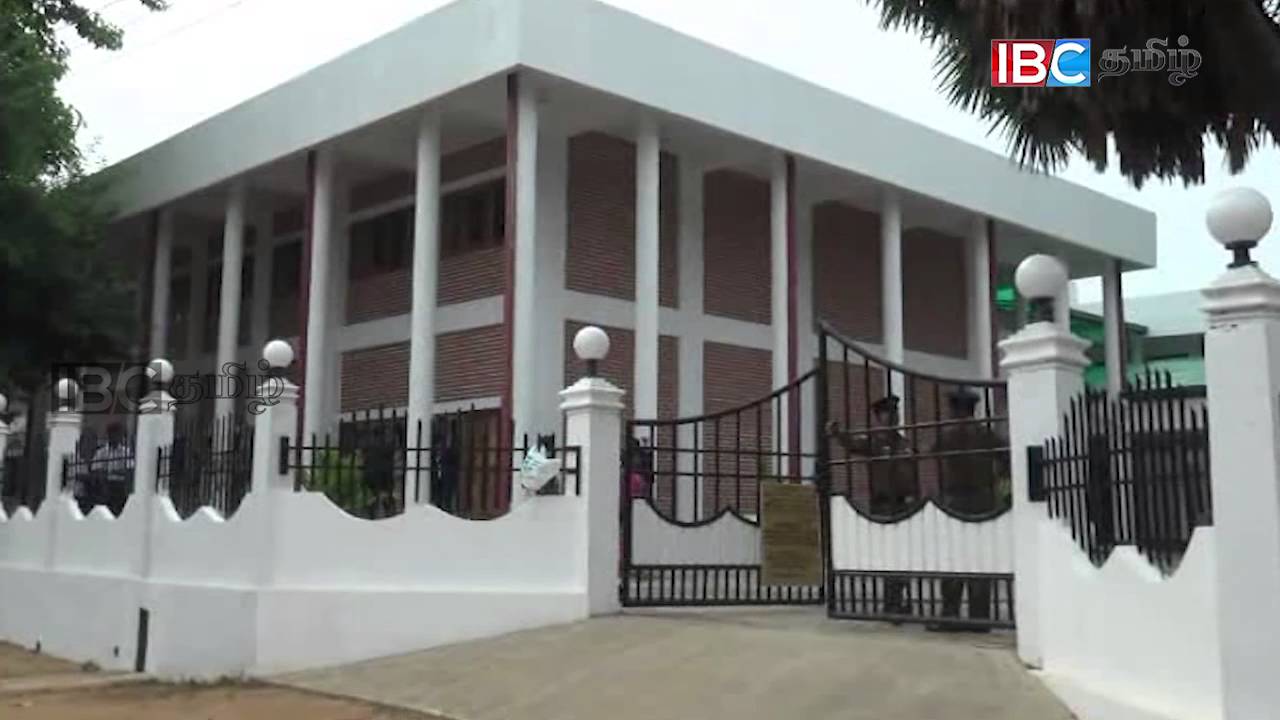
S.L. v Australia (CAT, 2022)
Potential violations: CAT art 3
 Unremedied
Unremedied
The UN says:
CAT (2022)Pursuant to article 3 of the Convention, [Australia] has an obligation to reconsider the complainant’s asylum application in the light of its obligations under the Convention and the present decision and to refrain from deporting the complainant while his application for asylum is being considered.

Australian customs officials watch Sri Lankans approaching Cocos (Keeling) Islands by boat in 2016. Mr S.L. reached the Cocos Islands in the Indian Ocean, over 2,000km from the Australian mainland, in 2012; this is not his boat. (image: Karen Willshaw, Sydney Morning Herald)
Mr S.L. is a Tamil Sri Lankan who was 4 years old when civil war broke out in his homeland in 1983. He attests that at the age of around 13, he was arrested and interrogated under torture on susciption of havinng connections with the armed Tamil separatists, the Liberation Tigers of Tamil Eelam (LTTE), and still bears scars from that ordeal. At 15, he was forcibly recruited by the LTTE and held a non-combat role for about a year.
Some years later, his father became a politician and Mr S.L. did some political campaigning. On one occasion, his parents were injured when someone opened fire on the party office, and on another, he and his father were beaten up at a party event. His father wanted to resign his elected office, but his party would not let him. Fearing for his son’s safety, he arranged for Mr S.L. to leave the country.
Leaving his wife and children, Mr S.L. fled by boat, reaching Australian territory in October 2012, aged 33, and applied for refugee protection. After 6 months in detention, he was released to live in the community. The Immigration Department interviewed Mr S.L. to assess his refugee claim in June 2016.
In July 2016, police in his hometown of Batticaloa brought charges against Mr S.L. under anti-terrorism legislation and, when he failed to appear in court, issued a warrant for his arrest. He could not get Australian authorities to take this new information into account.
Also in July 2016, Australia refused Mr S.L.’s refugee claim, owing to alleged inconsistencies in his account of events, and did not believe his claim to have been tortured. In August he appealed that decision, unsuccessfully. Australia maintained that Mr S.L. “did not have a risk profile ... that would expose him to adverse attention on his return” to Sri Lanka (para. 2.12). He pursued all further avenues of appeal available to him, unsuccessfully. In August 2019, he petitioned the UN Committee Against Torture.
Mr S.L. claimed that if he were sent back to Sri Lanka, Australia would violate his rights under article 2 (prevention of torture), article 3 (non-refoulement) and article 16 (prevention of cruel, inhuman or degrading treatment or punishment) of the Convention.
He requested interim measures to prevent his deportation while his communication was before the Committee, but the Committee declined to make this request of Australia.
Australia maintained that Mr S.L’s fear of being tortured upon return to Sri Lanka was not well founded, and that his claims had been assessed twice on merits, free of jurisdictional error.
The Committee countered that Mr S.L. had produced evidence of his claims, including the summons and arrest warrant in his name, as well as details of his LTTE name, badge and identification tag numbers.
The Committee was critical of Australia’s refugee assessment regime, to the extent that, inter alia: the Migration Act explicitly excludes common law principles of procedural fairness; the burden of evidence under the Migration Act is unduly onerous; country information relevant to Mr S.L.'s claim was not considered; avenues for appeal are confined to jurisdictional and procedural errors; that new information could not be grounds for reassessment; that, as a 'fast-track applicant', Mr S.L. was "not permitted to appear in person and explain the discrepancies on which the negative credibility finding was based"; that the Immigration Minister’s discretionary powers are exercised without transparent reasoning and, in this instance, that Mr S.L. was unrepresented for much of the time (attempting to represent himself in a foreign language and legal system) and not given legal aid.
Australia’s failure to assess key evidence which was unavailable initially, but nonetheless "central to the complainant’s protection claim" led the Committee to conclude that Australia had not discharged its "obligations to to undertake a comprehensive, individualized assessment of the foreseeable, present, personal and real risk that the complainant would be subjected to torture if deported to Sri Lanka" (para. 6.11).
The Committee found that deporting Mr S.L. would constitute a breach of CAT article 3 which prohibits refoulement. It asked Australia to reconsider Mr S.L.'s refugee application and to not deport him while this assessment was underway.
Australia appears not to have responded to the final views of the Committee Against Torture. If Mr S.L. was deported to Sri Lanka, it would be an actual, rather than potential, violation of the Convention.
Read the full decision: S.L. v Australia (November 2022)

Batticaloa Magistrates Court in east Sri Lanka, where Mr S.L. was summonsed to appear on terrorism charges in August 2016 (image: IBC Tamil)